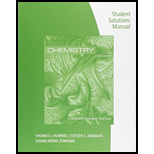
Student Solutions Manual for Zumdahl/Zumdahl/DeCoste?s Chemistry, 10th Edition
10th Edition
ISBN: 9781305957510
Author: ZUMDAHL, Steven S.; Zumdahl, Susan A.; DeCoste, Donald J.
Publisher: Cengage Learning
expand_more
expand_more
format_list_bulleted
Question
Chapter 19, Problem 79AE
Interpretation Introduction
Interpretation: Conclusions about the photosynthesis on the basis of the given experiments is to be stated.
Concept introduction: Glucose is made in the process of photosynthesis which is used by the cells to obtain energy. The process includes absorption of light, electron transport to produce NADPH, generation of ATP followed by conversion of carbon dioxide to form carbohydrates.
Expert Solution & Answer
Want to see the full answer?
Check out a sample textbook solution
Students have asked these similar questions
Can someone help me whats the issue?
a. The change in the Gibbs energy of a certain constant pressure process is found to fit the expression:
AG-85.1 J mol −1 +36.5 J mol ¹K-1 × T
A. Calculate the value of AS for the process.
B. Next, use the Gibbs-Helmholtz equation:
(a(AG/T))
ΔΗ
-
T2
to calculate the value of AH for the process.
None
Chapter 19 Solutions
Student Solutions Manual for Zumdahl/Zumdahl/DeCoste?s Chemistry, 10th Edition
Ch. 19 - Prob. 1RQCh. 19 - Prob. 2RQCh. 19 - Prob. 3RQCh. 19 - Prob. 4RQCh. 19 - Prob. 5RQCh. 19 - Prob. 6RQCh. 19 - Prob. 7RQCh. 19 - Prob. 8RQCh. 19 - Prob. 9RQCh. 19 - Prob. 10RQ
Ch. 19 - Prob. 1QCh. 19 - Prob. 3QCh. 19 - Prob. 4QCh. 19 - Prob. 5QCh. 19 - Prob. 6QCh. 19 - Prob. 7QCh. 19 - Prob. 8QCh. 19 - Prob. 9QCh. 19 - Prob. 10QCh. 19 - Prob. 11QCh. 19 - Prob. 12QCh. 19 - Prob. 13QCh. 19 - Prob. 14QCh. 19 - Prob. 15ECh. 19 - Prob. 16ECh. 19 - Prob. 17ECh. 19 - Prob. 18ECh. 19 - Prob. 19ECh. 19 - Prob. 20ECh. 19 - Prob. 21ECh. 19 - Prob. 22ECh. 19 - Prob. 23ECh. 19 - Prob. 24ECh. 19 - Prob. 27ECh. 19 - Prob. 28ECh. 19 - Prob. 29ECh. 19 - Prob. 30ECh. 19 - Prob. 32ECh. 19 - Prob. 34ECh. 19 - Prob. 35ECh. 19 - Prob. 36ECh. 19 - Prob. 37ECh. 19 - Prob. 38ECh. 19 - Prob. 39ECh. 19 - Prob. 40ECh. 19 - Prob. 41ECh. 19 - Prob. 42ECh. 19 - Prob. 43ECh. 19 - Prob. 44ECh. 19 - Prob. 45ECh. 19 - Prob. 46ECh. 19 - Prob. 47ECh. 19 - Prob. 48ECh. 19 - Prob. 49ECh. 19 - Prob. 50ECh. 19 - Prob. 52ECh. 19 - Prob. 53ECh. 19 - Prob. 54ECh. 19 - Prob. 55ECh. 19 - Prob. 56ECh. 19 - Prob. 57ECh. 19 - Prob. 58ECh. 19 - Prob. 59ECh. 19 - Prob. 60ECh. 19 - Prob. 61ECh. 19 - Prob. 62ECh. 19 - Prob. 63ECh. 19 - Prob. 64ECh. 19 - Prob. 65AECh. 19 - Prob. 66AECh. 19 - Prob. 67AECh. 19 - Prob. 68AECh. 19 - Prob. 69AECh. 19 - Prob. 70AECh. 19 - Prob. 71AECh. 19 - Prob. 72AECh. 19 - Prob. 73AECh. 19 - Prob. 74AECh. 19 - Prob. 75AECh. 19 - Prob. 76AECh. 19 - Prob. 77AECh. 19 - Prob. 78AECh. 19 - Prob. 79AECh. 19 - Prob. 80AECh. 19 - Prob. 81CWPCh. 19 - Prob. 82CWPCh. 19 - Prob. 83CWPCh. 19 - Prob. 84CWPCh. 19 - Prob. 85CWPCh. 19 - Prob. 86CWPCh. 19 - Prob. 87CPCh. 19 - Prob. 88CPCh. 19 - Prob. 89CPCh. 19 - Prob. 90CPCh. 19 - Prob. 91CPCh. 19 - Prob. 92CPCh. 19 - Prob. 93CPCh. 19 - Prob. 94CPCh. 19 - Prob. 95IPCh. 19 - Prob. 96IP
Knowledge Booster
Similar questions
- ASP please....arrow_forwardNonearrow_forwardConsider the structure of 1-bromo-2-fluoroethane. Part 1 of 2 Draw the Newman projection for the anti conformation of 1-bromo-2-fluoroethane, viewed down the C1-C2 bond. ✡ ぬ Part 2 of 2 H H F Br H H ☑ Draw the Newman projection for the gauche conformation of 1-bromo-2-fluoroethane, viewed down the C1-C2 bond. H F Br H Harrow_forward
- Please help me answer this question. I don't understand how or where the different reagents will attach and it's mostly due to the wedge bond because I haven't seen a problem like this before. Please provide a detailed explanation and a drawing showing how it can happen and what the final product will look like.arrow_forwardWhich of the following compounds is the most acidic in the gas phase? Group of answer choices H2O SiH4 HBr H2Sarrow_forwardWhich of the following is the most acidic transition metal cation? Group of answer choices Fe3+ Sc3+ Mn4+ Zn2+arrow_forward
- Based on the thermodynamics of acetic acid dissociation discussed in Lecture 2-5, what can you conclude about the standard enthalpy change (ΔHo) of acid dissociation for HCl? Group of answer choices You cannot arrive at any of the other three conclusions It is a positive value It is more negative than −0.4 kJ/mol It equals −0.4 kJ/molarrow_forwardPLEASE HELP URGENT!arrow_forwardDraw the skeletal structure corresponding to the following IUPAC name: 7-isopropyl-3-methyldecanearrow_forward
arrow_back_ios
SEE MORE QUESTIONS
arrow_forward_ios
Recommended textbooks for you
 Chemistry: The Molecular ScienceChemistryISBN:9781285199047Author:John W. Moore, Conrad L. StanitskiPublisher:Cengage Learning
Chemistry: The Molecular ScienceChemistryISBN:9781285199047Author:John W. Moore, Conrad L. StanitskiPublisher:Cengage Learning Chemistry for Engineering StudentsChemistryISBN:9781337398909Author:Lawrence S. Brown, Tom HolmePublisher:Cengage Learning
Chemistry for Engineering StudentsChemistryISBN:9781337398909Author:Lawrence S. Brown, Tom HolmePublisher:Cengage Learning Chemistry: Principles and PracticeChemistryISBN:9780534420123Author:Daniel L. Reger, Scott R. Goode, David W. Ball, Edward MercerPublisher:Cengage Learning
Chemistry: Principles and PracticeChemistryISBN:9780534420123Author:Daniel L. Reger, Scott R. Goode, David W. Ball, Edward MercerPublisher:Cengage Learning Chemistry & Chemical ReactivityChemistryISBN:9781337399074Author:John C. Kotz, Paul M. Treichel, John Townsend, David TreichelPublisher:Cengage Learning
Chemistry & Chemical ReactivityChemistryISBN:9781337399074Author:John C. Kotz, Paul M. Treichel, John Townsend, David TreichelPublisher:Cengage Learning

Chemistry: The Molecular Science
Chemistry
ISBN:9781285199047
Author:John W. Moore, Conrad L. Stanitski
Publisher:Cengage Learning

Chemistry for Engineering Students
Chemistry
ISBN:9781337398909
Author:Lawrence S. Brown, Tom Holme
Publisher:Cengage Learning

Chemistry: Principles and Practice
Chemistry
ISBN:9780534420123
Author:Daniel L. Reger, Scott R. Goode, David W. Ball, Edward Mercer
Publisher:Cengage Learning

Chemistry & Chemical Reactivity
Chemistry
ISBN:9781337399074
Author:John C. Kotz, Paul M. Treichel, John Townsend, David Treichel
Publisher:Cengage Learning